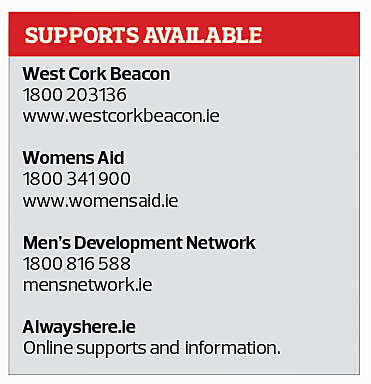
IF a partner or an ex makes you feel scared, controlled or intimidated, you may be experiencing domestic abuse.
There are many different forms of abuse.
It can be physical or it can be emotional, and it may have impacts that can or cannot be seen by other people.
Abuse can happen to anyone at any age and in any type of relationship. It can happen to adults and it can happen to teenagers.
You don’t have to be married or living with your partner for them to act abusively towards you.
What are the types of abuse people experience?
An abusive relationship is where one person uses abuse to control and have power over their partner in an intimate relationship.
Types of abuse include:
• Physical
• Emotional
• Online
• Sexual
• Economic (financial)
• Digital
Coercive control is another type of abusive behaviour.
This is when a boyfriend or girlfriend, partner, husband or wife, or ex uses an ongoing pattern of controlling, coercive and threatening behaviours to trap the person in a relationship.
A person experiencing coercive control may also change their routines and lose contact with family and friends.
What are my options if I am in an abusive relationship?
Recognising that you are being abused is an important step.
You may feel you need time to think about your situation, or perhaps you have already made up your mind to end the relationship.
Whatever you decide, your safety (and that of any children) is always the priority.
If you are being subjected to abuse by a current or former partner, you can get legal protection through the courts. The main kinds of protection available are safety, protection and barring orders.
What do each of the domestic violence court orders cover?
A Safety Order is an instruction from the court which stops the person accused of abusive behaviour (the respondent) from committing further violence or threats of violence. The respondent does not have to leave the home.
If the person is not living with you, the safety order bans them from watching or being near your home and following or communicating (including electronically) with you or a dependent person such as a child. A safety order can last up to 5 years.
A Barring Order is a full or long-term order from the court. It directs the respondent to leave - or stay away from - your home and any dependent children. In some cases, it can direct them to stop using - or threatening to use - violence against you or putting you in fear.
It may also direct them to stop following you, or communicating verbally or electronically with you or dependent children.
It can only be issued to current spouses or civil partners, or certain people who have an equal or greater ownership rights in the home than the respondent. Parents can apply when the abuser is a non-dependent child.
While you are waiting for the court to decide on your application for a Safety or Barring Order, the court can give you an immediate temporary order called a Protection Order or an Interim Barring Order.
A Protection order has the same effect as a Safety Order but because it is only intended to last until the court decides on your case, it is temporary. An interim Barring Order lasts for a maximum of 8 days working days.
What is domestic violence leave?
Since 27 November 2023, you have a legal right to 5 days of paid domestic violence leave, if you need to take time off work because of domestic violence and abuse.
This could be for medical visits, legal proceedings, counselling, looking for other accommodation or accessing domestic violence services.
The leave can be taken where you are directly experiencing domestic violence and abuse, or where you are supporting a relevant person.
A ‘relevant person’ can be your:
• Spouse or civil partner
• Someone you live with
• Someone you are in an intimate relationship with
• Child who is under 18
• Another dependent person

You can take some basic steps to help and support a friend, family member, colleague, neighbour or anyone who confides in you that they are experiencing domestic abuse. You can offer emotional support and you can offer practical support. There are a number of support organisations and supports.
West Cork Beacon provides a safe, confidential, non-judgemental, trauma informed, free support service for women experiencing domestic abuse and for anyone experiencing sexual violence. Their freephone help-line 1800 203136 is available for women to call Monday to Friday, 9am -4.30pm. Their website is www.westcorkbeacon.ie.
Womens Aid have a national freephone helpline 1800 341 900 available 24 hours a day, 7 days a week. The Men’s Development Network operates the National Male Advice Line on 1800 816 588 for men experiencing or who have experienced domestic violence.









